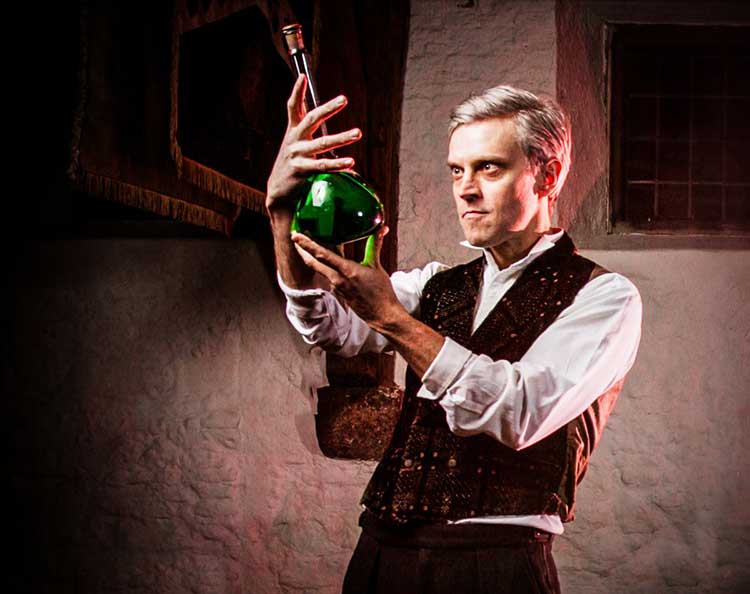
The Strange Case Of Dr Jekyll & Mr Hyde by Theatre Mill
The Merchant Adventurers’ Hall
Until March 22
£20-£25
Once again, Theatre Mill delivers a spectacular site-specific gem to York audiences.
After its 2014 success, the company presents The Strange Case Of Dr Jekyll And Mr Hyde, adapted by Nick Lane and directed by Samuel Wood.
After having brought new life to the Guildhall with Witness For The Prosecution, and to the Mansion House with The Importance Of Being Earnest, Theatre Mill now picks the Merchant Adventurers’ Hall as the setting for the play, embracing its characteristic haunted atmosphere.
Samuel Wood explains the importance of the location: “These exceptional and irreplaceable buildings are steeped in hundreds of years of history, where generation after generation of men and women have walked, lived, and contributed to its life spirit and preservation… They are in my opinion the final character that makes the play complete.”
Indeed, with the support impeccable lighting and stage design, the mysteriousness of the Merchant Adventurers’ Hall becomes the perfect counterpart for a play that leaves behind the light and pleasurable tones of The Importance Of Being Earnest to concentrate on more dramatic, existential, complex questions.
Even though the original story was written by Robert Louis Stevenson in 1885, The Strange Case Of Dr Jekyll And Mr Hyde keeps on having current relevance as it addresses dualities at the base of human psyche.


It explores deep tensions, such as the difficult balance between ambition and love, individualism and selflessness, rationality and shadows, the importance of creating a legacy, igniting progress versus living a modest life, concentrating on immediate, simple, genuine values.
What makes a man human and what deprives him of his humanity? Where lies the boundary between respecting life and sacrificing the present for a greater good?
The company handles the narration through a complex circular structure punctuated by frequent flashbacks.
All the signature elements of Theatre Mill are there: an excellent immersive use of space, the simultaneous coexistence of several temporal layers, dynamic and well-synchronised stage changes that become the occasion for dance and singing.
The cinematic power we already enjoyed in previous Theatre Mill productions is now pushed a step further with a spectacular slow motion fight scene.
James Weaver is an impressive presence. He uses his whole physical presence in depicting the passages between Dr Jekyll and his alter ego.
Through movements, attitudes, tones of voice, we witness the transformation of the tormented, ambitious, limping scientist into the vigorous, strong, ruthless Mr Hyde. Because, unlike many other adaptations, this time Mr Hyde is not physically deformed: he embodies the ancestral power of human darkest dreams and desires, and instils new strength in the scientist’s body.
This touch, added by writer Nick Lane, has been inspired by his own experience of physical injury: “I was in a car accident in my mid-twenties, and ever since then I’ve moved a little awkwardly…
“I thought to myself, if someone were to come to me with a drug and tell me that if I took it, I would feel as physically well as I did prior to the car accident, but that no one would like me, would I take it?
“Would I believe I could conquer that particular side effect? And if I did take the drug would I be able to stop? That’s what fascinated me.”
Another original addition from the playwright is assigning more space and complexity to the character of Eleanor Lanyon (Viktoria Kay) as Jekyll’s muse and inspiration, trapped in a dry marriage and willing to join the exploration of the human mind at cost of risking her own safety.
Viktoria Kay, Adam Mels, and David Chafer deliver a remarkable performance, juggling more characters during the whole play.
Overall, another great immersive experience by Theatre Mill, not to be missed.
